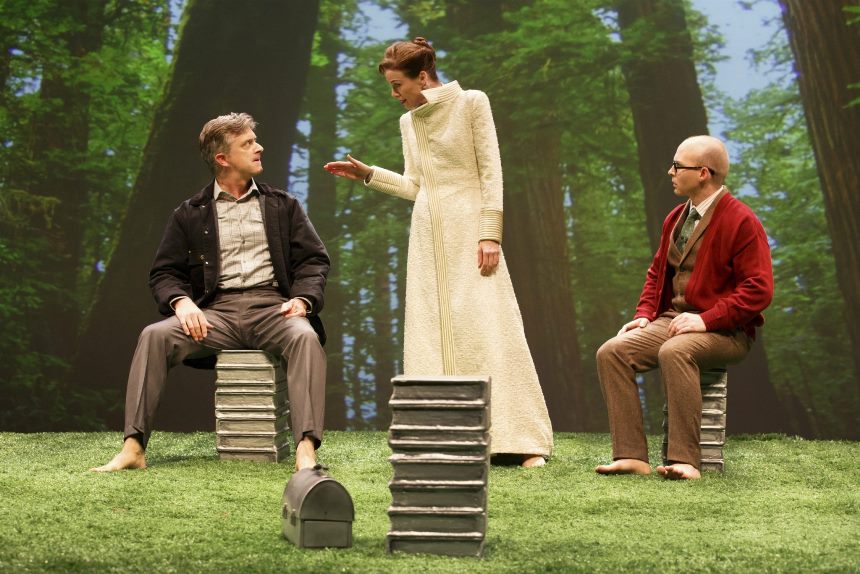Wise Words on Wednesday: What weighs a man down

It is not the cares of today, but the cares of tomorrow, that weigh a man down.
– George MacDonald
"We are travellers…not yet in our native land" – St. Augustine

It is not the cares of today, but the cares of tomorrow, that weigh a man down.
– George MacDonald
 When Fr. Ray Kelly went on Britain’s Got Talent…
When Fr. Ray Kelly went on Britain’s Got Talent…
https://www.youtube.com/watch?v=t9MzWftt0ls


Summary
Anticipating “affecting scenes”, our protagonist wanders away from the group. He discovers that the grass, “hard as diamonds”, makes progress slow and painful. He is followed by The Big Ghost and one of the solid people. It turns out that, on earth, the ghost was the boss of the bright, solid man, who is named Len. Len had murdered a common acquaintance, a man called Jack. The Big Ghost is horrified Len has been allowed into this land. Len explains that his victim is there too and that he will see him soon.
The Big Ghost then asks Len if he’s ashamed of himself, to which Len replies “Not as you mean. I do not look at myself. I have given up myself” and explains that this began following the murder. The Big Ghost asks Len why “a bloody murderer” is here, while he had been living in the Grey Town. Len says that, although he’ll come to understand, it’ll be difficult to comprehend for the time being, so best to not bother about it.
But the Big Ghost says “I gone straight all my life. I don’t say I was a religious man and I don’t say I had no faults, far from it. But I done my best all my life, see? I done my best by everyone, that’s the sort of chap I was. I never asked for anything that wasn’t mine by rights” Len explains that the situation is far better than he thinks, saying “I haven’t got my rights, or I should not be here. You will not get yours either. You’ll get something far better. Never fear.” The Big Ghost says he’s “not asking for anybody’s bleeding charity”, but Len exhorts him to do just that: “Ask for the Bleeding Charity. Everything is here for the asking and nothing can be bought.”
At this point, we begin to see that the Big Ghost is not going to accept a Heaven where someone like Len is also welcome. Len attempts to correct this attitude without much success. He points out that the Big Ghost was neither a decent man, nor did he even “do his best”. The Big Ghost was hard on his employees, as well as on his wife and children. Len goes on to explain that murdering Jack wasn’t actually the worst thing he did: “I murdered you in my heart, deliberately, for years. I used to lie awake at nights thinking what I’d do to you if ever I got the chance”. He explains that, because of this, he has been sent to the Big Ghost to ask for his forgiveness and to serve him for as long as he would like.
The Big Ghost angrily tells Len to stay out of his “private affairs”, even though Len says that “There are no private affairs”. It is at this point the Big Ghost declares that he’s not going to go to the mountain at all: “Tell them I’m not coming, see? I’d rather be damned than go along with you”
Questions
Q1. What do we learn about the relationship between the Big Ghost and the solid person who meets him? Who is Jack?
Q2. Why is the Big Ghost surprised to see Len?
Q3. Why does Len say he isn’t ashamed? What virtue is he displaying?
Q4. On what basis does the Big Ghost think he should be granted admission? According to Len, would he get in on that basis?
Q5. What does Len say is the worst thing he’s ever done? Why is it worse than killing Jack?


Summary
The bus climbs over a cliff and travels across “a level, grassy country through which there ran a wide river” where it lands. All the passengers push and shove to get out.
Lewis leaves the bus where “the light and coolness that drenched me were like those of summer morning, early morning a minute or two before the sunrise”. He has the sense of “being in a larger space…which made the Solar System itself seem an indoor affair”. This gives him a feeling both of freedom, but also of exposure to possible danger.
Looking at his fellow-passengers, Jack sees them as almost transparent. The “grass did not bend under their feet: even the dew drops were not disturbed”. At this point he realizes that “the men were as they always had been” and that “it was the light, the grass, the trees that were different; made of some different substance, so much solider than things in our country that men were ghosts by comparison”. He tries to pluck a daisy and fails, it being “heavier than a sack of coal”. One ghost runs back into the bus, screaming “I don’t like it!”.
The Big Man asks the Driver when they’ve got to go back, but he replies that they can stay as long as they please. One of the quieter and more respectable ghosts comments to Lewis that personally he left the Grey Town to get away from this riff-raff!
Our protagonist looks around and sees some great mountains with “cities perched on inaccessible summits”. In the same way that the Grey Town seemed to be frozen in time, here the light does not change, with “the promise or the threat of sunrise”.
He then sees “bright” people coming to meet them, whose “strong feet sank into the wet turf”. Some of these people are naked, others robed, but it seemed to make very little difference, “the naked ones did not seem less adorned, and the robes did not disguise in those who wore them the massive grandeur of muscle and the radiant smoothness of flesh“. Although some had beards, they all seemed ageless. Two more ghosts scream and hide in the bus. The remaining phantoms huddle close together.
Questions
Q1. How is this new land described? What do you think is the significance of these descriptions?
Q2. What does Lewis come to realize about himself and the other passengers?
Q3. What does the Bus Driver say about their stay in this new land?
Q4. What annoyed the Respectable Ghost?
Q5. How are the “bright” people described? What do you think is the significance of this?
Q6. Why do some of the phantoms hide in the bus?


Summary
The Tousle-Headed Poet explains that his parents never appreciated him. The schools he attended, the education system in general and capitalism all failed to recognize his genius. During the War, he was a conscientious objector and moved to America. After money troubles and poor treatment by a girl, he jumped under a train. He is convinced that, while all the others would return, he would stay at their destination and finally receive the recognition he deserved.
A fight breaks out in the bus. Nobody is hurt, but when it is over, our protagonist finds himself at a different seat with a new companion, an Intelligent Man with a large nose and bowler hat. His new companion explains to him why the town seems so empty, that everyone there is so quarrelsome that they keep moving further and further away from each other.
Some residents of the town are identified: Tamberlaine, Genghis Khan, Julius Caesar, Henry the Fifth and Nepoleon. Some had gone to visit Napoleon, a journey which took fifteen thousand years. They found a huge house in the middle of nowhere with Napoleon “Walking up and down-up and down… never stopping for a moment…muttering to himself all the time. ‘It was Soult’s fault. It was Ney’s fault. It was Josephine’s fault…’”
At this point, the Intelligent Man shares his plan. He says “there’s no proper economic basis for any community life. If they needed real shops, chaps would have to stay near where the real shops were… It’s scarcity that enables a society to exist”. His solution is to “come back with some real commodities” which he could sell, forcing people to live nearby. This would also provide “safety in numbers”, particularly when the dusk eventually turns to night… The Big Man and the others tell the Intelligent Man to shut up, under threat of violence.
A nearby passenger, “A fat clean-shaven man”, tells Lewis that “there is not a shred of evidence that this twilight is ever going to turn into a night. There has been a revolution of opinion on that in educated circles”, arguing instead that it is a precursor to the dawn. He rejects the Intelligent Man’s “earth-bound” desire for “real commodities”.
The greyness outside begins to subside and the bus is fulfilled with light. Our protagonist goes to open the window, but it is forcefully shut by the Intelligent Man. The Big Man encourages him to hit Lewis. The cruel light reveals the “distorted and faded” faces. Then Lewis then sees his own reflection in a mirror…
Questions
Q1. What is the sin of the tousle-haired poet? What is he expecting to find in Heaven?
Q2. According to the Intelligent Ghost, why does The Grey Town seem so empty?
Q3. What solution does the Intelligent Ghost present?
Q4. What spiritual lesson can you draw from the way houses are constructed in The Grey Town and their poor function?
Q5. How would you describe the outlook of the “fat clean-shaven man”?
Q6. What does the light reveal?


I thought it would be good to pull together all of my notes from our reading group’s discussion of The Great Divorce by C.S. Lewis.
Below are links to the blog posts for each chapter which contain my notes and discussion questions:
Preface
Chapter 01 | Chapter 02 | Chapter 03 | Chapter 04 | Chapter 05 | Chapter 06 | Chapter 07
Chapter 08 | Chapter 09 | Chapter 10 | Chapter 11 | Chapter 12 | Chapter 13 | Chapter 14
Below are PDF versions of the above notes, one for the facilitator (which contains the discussion questions) and one for participates (which just contains an extended summary of each chapter).